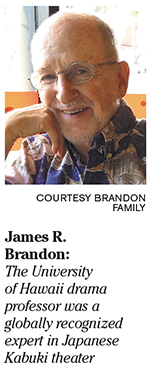UH theater professor was top Western authority on Kabuki
Wayne Harada / Special to the Star-Advertiser
James R. Brandon, a pioneering University of Hawaii drama professor-director who translated classic Kabuki theater and made it accessible to English-speaking audiences, died Sept. 19 under hospice care in Honolulu. He was 88.
For more than a half-century, he was an educator, actor, director, playwright and author of things Kabuki; he translated and directed the classical Japanese plays, and triggered discussion and learning through books he published and courses he taught.
His efforts planted the seeds to inspire other Asian scholars and peers to explore and enjoy his niche in the creative arts, and he opened Kabuki to a global audience from his Hawaii base.
"I know of no other person who has accomplished as much as he has done -- taking the work of one country (Japan) and presenting it so beautifully," said Terence Knapp, his UH colleague for more than three decades -- now retired and an emeritus professor -- who specialized in Shakespearean and classical drama while Brandon focused on Kabuki and its intricate staging rituals. "He was a pioneer in staging Asian theater for the rest of the world; he started it all."
Elizabeth Wichmann-Walczak, professor and head of the Asian Theatre Program at the university, was mentored by Brandon. She described him as "an extraordinary person -- a groundbreaking, insightful and prolific scholar with exceptionally broad and deep interests, focusing on Japan and especially Kabuki but encompassing Southeast Asia, India, Korea and China.
"And one of the finest teachers I've ever known," said Wichmann-Walczak, who has engaged Beijing opera the way Brandon embraced Kabuki. "He opened the world of Asian theater study for me; gave me the gift of field research skills; modeled for me the role of a teaching editor, scholar and artist; and continued to challenge me and help me grow in every respect of my professional life throughout his own. I will be forever grateful to him, as will so many others."
Brandon was emeritus professor of drama and theater at the UH-Manoa campus, where he served for 32 years, joining the staff in 1968 and retiring in 2000.
Audiences will especially remember Brandon for such landmark translated Kabuki shows as "Sukeroku: Flower of Edo" and "Narukami the Thundergod" at Kennedy Theatre.
As his reputation grew with study visits to Japan, Brandon befriended icons of Kabuki theater. Another of Brandon's triumphs, "The Forty-Seven Samurai," was co-translated and co-directed with esteemed Japan Kabuki artist Nakamura Matagoro. It premiered at Kennedy and made a historic tour of Hawaii and 13 mainland states between March and May 1979.
Brandon is credited with authoring about 80 articles, book chapters and reviews in his specialty, and writing an additional 20 books, making him the eminent authority on Kabuki to Western followers. He created conversations where there were none, not just for Kabuki, but for Javanese theater.
His volumes -- such as "Theatre in Southeast Asia" (1967), "On Thrones of Gold: Three Javanese Shadow Plays" (1970) and "Kabuki: Five Classic Plays" (1975) -- were classroom textbooks.
He amassed numerous commendations and awards, including the Imperial Decoration of the Order of the Rising Sun, Gold Rays with Rosette, from the government of Japan; the John D. Rockefeller III Award from the Asian Cultural Council for his exemplary contributions to the understanding and appreciation of Asian theater; the UH Regents' Medal for Outstanding Teaching; a national award as Outstanding Teacher of the Year from the Association for Theatre in Higher Education; and several Po'okela Awards from the Hawaii State Theatre Council for theatrical excellence.
His wife of 54 years, Reiko Mochinaga Brandon, herself an artist in textiles, theater sets and costume design, was one of his Japanese teachers in postwar Japan, when she was a student teaching Japanese at the American Embassy during the era Brandon was discovering "this incredible theater form (Kabuki) in Japan," she said.
Brandon had been drafted into the Army and served during the Korean War, but headed to Japan for his R&R and discovered Kabuki. "He had acted in so many plays, including Shakespeare, but he was totally stunned and impressed with Kabuki after seeing it. It was something he wanted to do."
Their meeting, she said, was "the beginning of our life together." They wed in Michigan between mutual degree and commitment grants in Asia and Europe.
"We never competed in our careers, but supported each other," said his widow, who was an East-West Center scholar who earned a Master of Fine Arts from UH. They shared parallel careers when she ventured into theater sets and costumes while he translated and directed Kabuki dramas and comedies.
Brandon was born in Mazomanie, Wis. He earned his Ph.D. from the University of Wisconsin in 1955 and joined the Foreign Service for six years, working in Java and Japan. Upon his return to the U.S. in 1961, he began teaching Asian theater at the University of Michigan's Department of Speech and Comparative Literature, where he directed his first two Kabuki productions in English. It was after he joined UH-Manoa, however, that he became the prolific trailblazing authority of Kabuki in English.
Besides his wife, Brandon is survived by a niece, Janet Wright.
A memorial celebration of his life and achievements will be held at 1 p.m. Nov. 29 at Kennedy Theatre.


